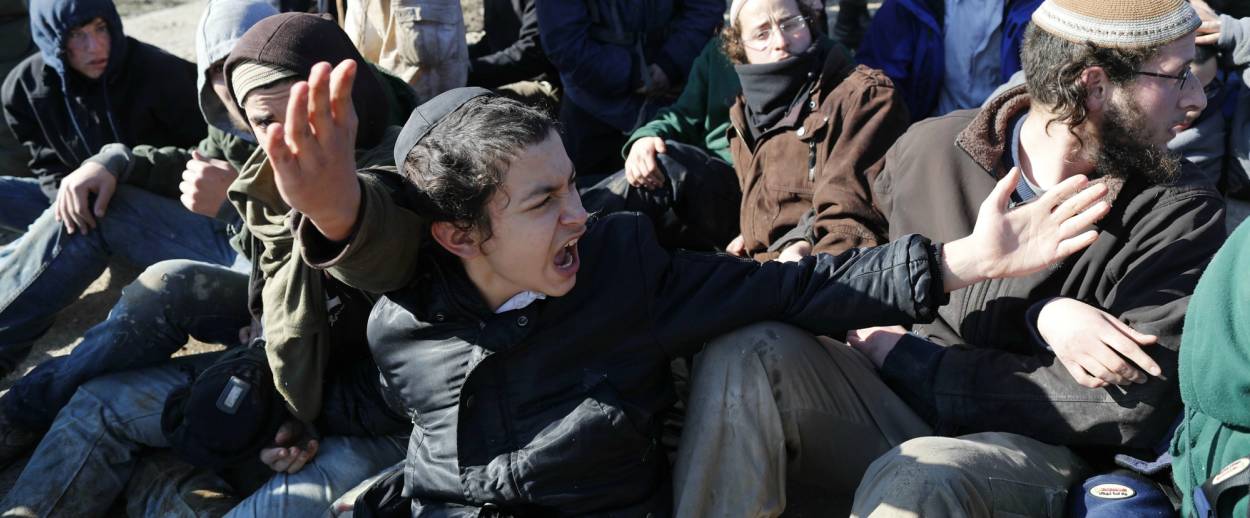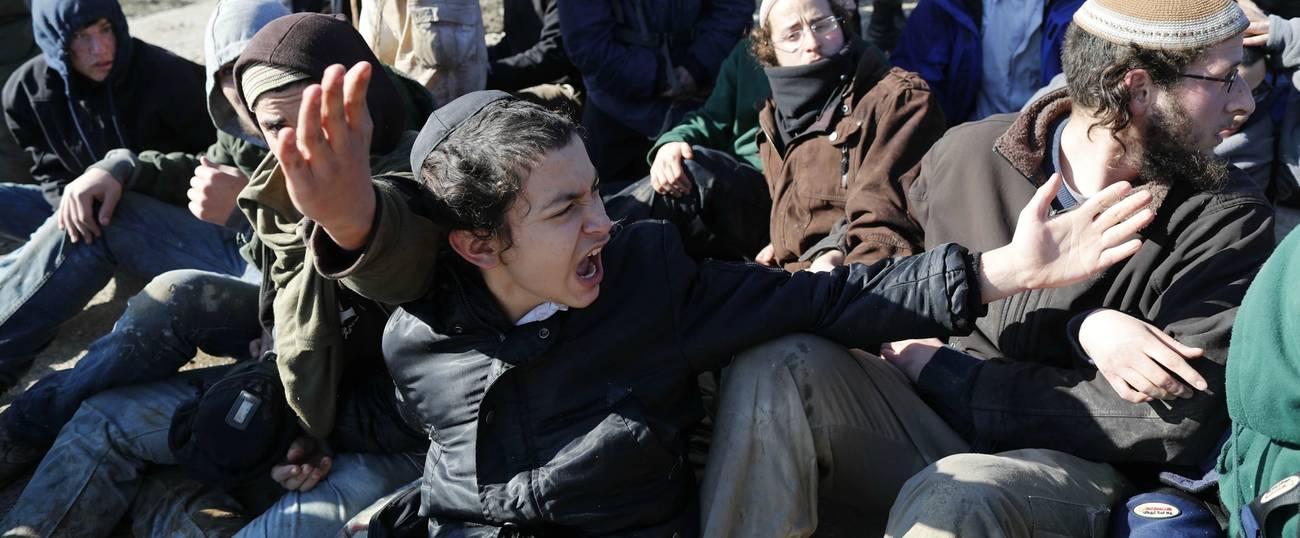The Amona Conundrum
The dismantling and evacuation of the Amona outpost in the West Bank has once again put Israel’s moral and legal mettle to the test




Jews cowering in a synagogue filled with sacred books as security forces ram the doors—sounds like a scene from another place, a different time. Invariably, the image transports us to Europe, to the Jew as the consummate victim, to events about which our senses of right and wrong, just and unjust, are entirely unambiguous.
The evacuation of Amona last week was painful for many reasons, not the least of which was an image both similar and dramatically different. Once again, Jews cowered in a synagogue. Once again, they sat on the floor at the base of bookcases overflowing with sacred texts. And once again, it was clear that it was but a matter of time until the security forces outside would breach the barrier, enter the synagogue and carry the Jews away.
This, of course, was not Europe, and the soldiers were hardly Nazis—they were Jews whose mission was to defend the rule of law in a Jewish state. So the pain many of us felt stemmed not from the image of Jews as victims. This time, as we sat in front of screens, in rapt attention, we felt the painful longing for a moral clarity we have long since lost.
That was not because there was any question that Amona had to be dismantled. The Supreme Court had ruled that the settlement sat on private Palestinian land, and it therefore demanded that its inhabitants leave. One can question the Court’s ruling or even the activism of the court in general. Yet the Court is the Court. Menachem Begin once said to the settlers of Elon Morhe, who the Supreme Court had also instructed to move but who were confident that Begin would stand by their side and resist the bench: “There are judges in Jerusalem.” Where there are no judges, or where no one heeds them, civil society cannot persevere. A government that bypasses the Supreme Court or ignores it sows the seeds of a democracy’s end.
Amona’s dismantling was critical to Israel’s survival. Or so we told ourselves.
Indeed, many Israelis believe that Amona is not the issue; the entire settlement project endangers Israel’s future. After all, if Israel’s political right gets its way and annexes the West Bank as Naftali Bennett recently said he hoped Israel would, what possible future is there for a Jewish and democratic state? What will become of the 2.5 million Arabs who live in what many Israelis call Judea and Samaria? Does anyone really imagine that the world would countenance Israel’s trying to relocate those people on the other side of the Jordan River? Or that Jordan would acquiesce to that? Or that the project is even remotely logistically feasible? Or that most Israelis, faced with the too-familiar images of what soldiers uprooting entire communities looks like, would stand idly by?
Shall we then make these 2.5 million Arabs Israeli citizens? Doing so would make Arabs about 40 percent of Israel’s population, a number what would likely soon grow. Add to that the Haredi population, and Zionists would be a minority in the Jewish state. “Citizenship for all” is thus another path to the destruction of everything we have built.
Others, therefore, suggest that we grant these Arabs full civil rights, but not voting rights. Yet a country in which millions of people have no voice in selecting their government is essentially apartheid—is it not? Are we willing to destroy Israel by ridding it of any legal, moral, or international legitimacy? If matters are so clear, why did we feel no moral clarity as we watch Amona brought to an end? Was not the triumph over Amona the triumph of Israel’s democracy and rule of law? Decent as most of its residents were, did they not, even with the best of intentions, spell the doom of this place we call home?
Yes, but no. What we saw when as we watched the demolition of Amona’s synagogue was also the shattering of Israel’s founding ethos. Nothing articulated that ethos better than the old Zionist song, “Anu Banu Artza“: “We have come to the Land to build and to be built on it.” Prior to statehood, Jews immigrated to Palestine and built on whatever land they could purchase. After the War of Independence, when Israel had captured land not included in the UN Partition Plan maps, Jews built on that land, too. The middle of the Galilee, including small cities like Carmiel, is Jewish because Jews built on the land Arabs had lost in a battle that the new state’s neighbors should never have started. In 1949, no one asked whether Jews ought to build on the land Israel had just captured. Political times were different, international standards were more permissive and, perhaps most importantly, building up the land was the oxygen of the Jewish state. That is why after 1967 many of those who began to build across the Green Line assumed they were doing precisely what their parents or grandparents had done. They were returning to more of the Land, and building on it. Was that not the very essence of Zionism? Where they not the newest wave of Zionism’s pioneers?
Almost half a century has passed since the beginning of the settlement project. Some Israelis believe that the project threatens Israel’s very being, while others see it as the embodiment of what made—and still makes—Israel viable.
In truth, both sides lost last week. Were we more attuned to our souls and our history, we would all be grieving. To save Israel’s civil society, there was no choice but to dismantle Amona. Yet with what are we left? In what do we still believe? If Zionism is no longer about settling the land, building on it and being built on it, then what is Zionism? If A. D. Gordon’s view that only through working the land, with dirt ever-present under their nails, would Jews be redeemed now seems quaint and naïve, what vision for Israel does animate us? Do we as a collective still believe in anything at all? If we do, what is it? And if we do not, why do we dare imagine we can long survive in this region?
The bitter tragedy of Amona is that we had no choice but to batter in those doors, but that in smashing them, we also continued the dismantling of our national myth. Zionism transformed the Jewish people because it was aspirational—it made being Jewish about being part of a transformative project. Have we lost that, perhaps because we, ourselves, have dismantled it?
If this was a week when we should have mourned, then next week and beyond need to be a time of re-imagining, of reviving dreams, of rediscovering purpose. Zionism will survive only if it and its state are aspirational; our children and theirs will live on this land only if they can still believe, without self-conscious discomfort and with soul-filling joy, that we have returned to this land to build on it, and in so doing, to be built on it.
Daniel Gordis is Koret Distinguished Fellow at Shalem College in Jerusalem. His latest book, Israel: A Concise History of a Nation Reborn, was just awarded the National Jewish Book Award for Book of the Year.